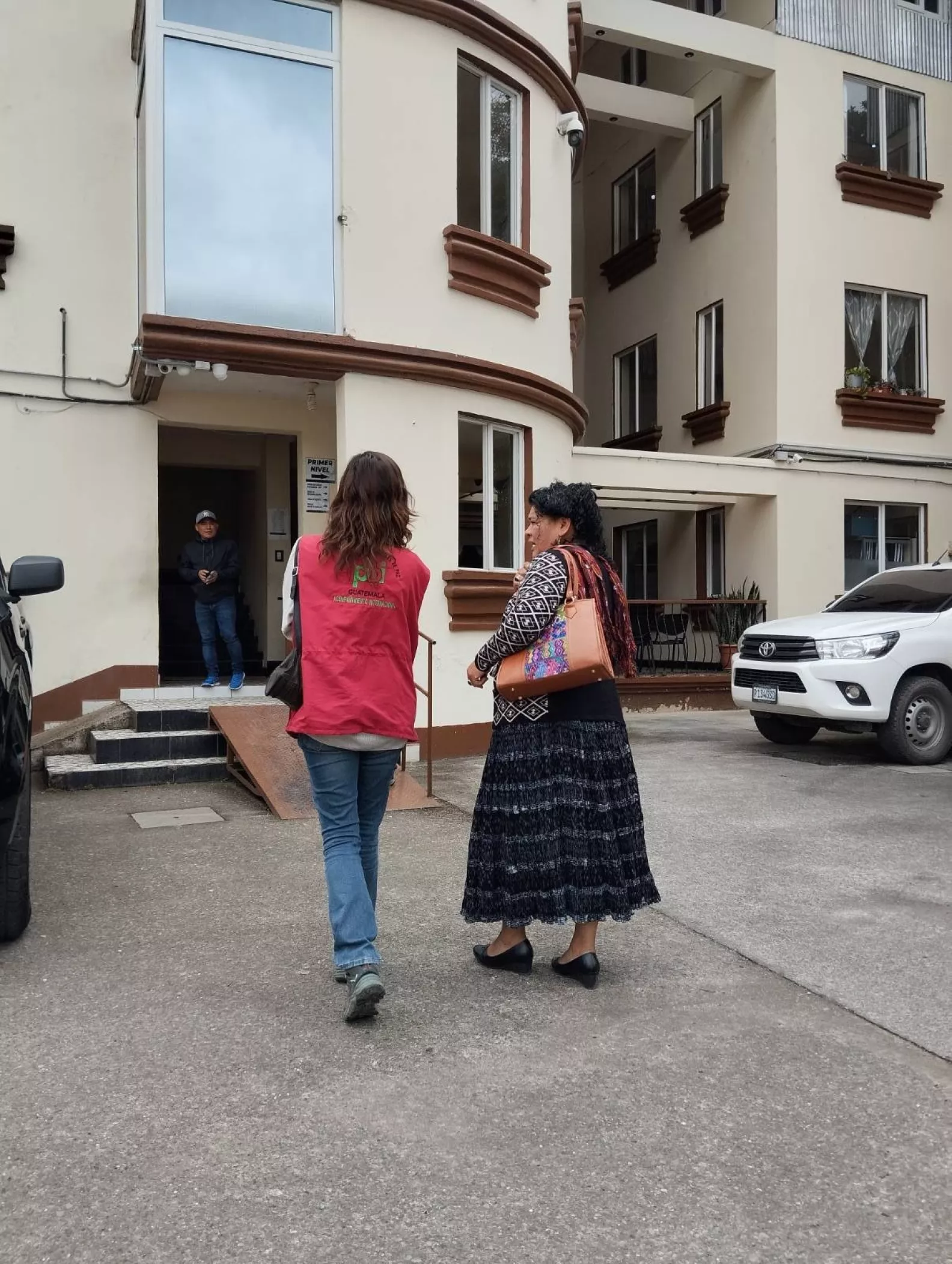agrarian struggle threatened

In July 2018Peace Brigades International started accompanying CCDA – Verapaces Region, which covers the departments of Alta and Baja Verapaz as well as El Estor, Izabal and part of the Zona Reyna in Quiché. CCDA’s main objectives are the defense, recuperation of and access to land. In this region alone CCDA accompanies more than 150 Maya q’eqchi’ communities who have been repressed and stripped of their land or are immersed in conflicts regarding land tenure. Due to their work many of their members have faced threats, criminalization processes, kidnappings, and murders.
The Campesino Committee of the Highlands (CCDA) is an indigenous, campesino organization who has fought for access to land, defense of territory, decent work, and agrarian justice for more than 36 years. It was founded in 1981 in the Western Highlands and after the Peace Accords it expanded to the Alta Verapaz region. At present CCDA works in 20 departments in Guatemala. Aside from being a campesino movement, CCDA has a coffee cooperative that sells products to Canada and Europe. Sales from these products help sustain the organization.
An organization led by women
CCDA – Verapaces Region is led by two women: Lesbia Artola coordinates the organization and Imelda Teyul facilitates the organizing aspects of the work. Both leaders are targets of threats, intimidations, and smear campaigns with clear chauvinistic tones whose intention is, among others, to question their capacity as leaders because they are women. As defenders they have to face the same risks as their male counterparts and in addition specific risks marked by sexism.
The organization incorporates a gender focus in its work, accompanying female CCDA members whose rights have been violated during violent extrajudicial evictions, providing psychological support and legal advice. The organization places emphasis on their accomplishment of greater equality between women and men in the communities they accompany. According to Lesbia Artola, the workshops they facilitate on new masculinities have contributed to greater awareness by men related to gender equality. She comments that with this work they have achieved greater participation of women at the community level.The organization’s board of directors sets the example by being composed of equal numbers of women and men: years ago there was no recognition of women’s struggles. Sometimes during evictions, women were on the frontlines, but they were never recognized for that role. Today female defenders of territory are recognized, there is more participation, boards of directors are composed of men and women, our ancestral authorities are women and men. There is more participation by women in all spaces. However, Lesbia is clear that more work needs to be done to attain greater active participation by indigenous women at the municipal, departmental, and national levels.
The roots of the land conflict in the Verapaces
The struggle for land was one of the main causes of the internal armed conflict that Guatemala suffered for 36 years (1960-1996). This problem continues today without a solution and is the heart of the struggle of many campesino and indigenous organizations, such is the case of CCDA. The recognition of land titles and disputes over land titles continues to be a huge problem in many regions of Guatemala, including the Verapaces.
With the liberal reform at the end of the XIX century, the elite landowners came to power (Justo Rufino Barrios) and enacted laws with coercive force of the State to takeover communal lands of indigenous peoples suitable for cultivating coffee and at the same time imposed a regime of semi-slavery: forced labor on farms and in the construction of infrastructure to facilitate development of the new model. (…) Wealth for a few and misery for many. The indigenous q’eqchi’ population stripped of their lands, were subjected to a feudal economic system that forced them to work as mozos colonos* on coffee plantations.
According to Jorge Santos, Coordinator of the Unit for the Protection of Human Rights Defenders in Guatemala (UDEFEGUA), Alta Verapaz was the last department to emerge from the mozo colono system. Over time the plantations changed owners but the mozos colonos stayed on the lands. When the mozo colono system ended, campesino and indigenous families who had worked the lands were evicted from the plantations and were not given another alternative for survival. Thus, they were forced to reclaim land where they could live and cultivate their food. To date the situation has not been resolved, there are numerous conflicts surrounding land tenure, which often ends in evictions of families and entire communities who are usually not offered an alternative. The inequality in the distribution of land in Guatemala has not changed in the last 50 years, and continues to be one of the highest in Latin America.
For Lesbia Artola the concepts are mistaken, as campesinos are branded as land invaders, but from her point of view the true invaders are the landowners and companies. However, they accuse the q´eqchi’ peoples of invading their own territory, of which they have been stripped throughout history.
Dialogue as an alternative to conflicts
CCDA seeks peaceful means to resolve land conflicts., actively participating in dialogue processes with different state institutions. In 2017, after a protest next to the National Palace in which 400 q´eqchi’ families participated, they were able to sign an agreement with Vice President Jafeth Ernesto Cabrera Franco to establish a dialogue table. In the agreement they prioritized 42 communities and established roadmaps aimed at finding solutions to agrarian conflict. Representatives from said communities participated in the dialogue sessions to discuss problems of the evicted communities, access and adjudication of lands, and communities in protected areas. The dialogue roundtables are convened by the Presidential Commission on Dialogue and various state institutions participate, such as the Secretariat for Agrarian Affairs (SAA), Land Fund (FONTIERRAS), Ministry of Agriculture, Cattle, and Food (MAGA), Ministry of Interior (MinGob), Presidential Commission for Human Rights (COPREDEH), National Council on Protected Areas (CONAP), National Forest Institute (INAB), and Human Rights Ombudsman´s Office (PDH).
In December 2018, as a result of these negotiations FONTIERRAS signed an agreement to purchase land to relocate 81 families from five communities. These communities, some whom have suffered evictions, will finally have their own lands to live on and cultivate. However, Lesbia regrets that the accomplishments are few: this is headway, but imagine how many years we have been asking for justice. This was for 81 families, but many more in the region continue with the same problems and suffer from agrarian conflicts. She also states that after the roadmap was established, the level of conflict increased. 2018 was the worst year for CCDA in terms of aggressions against its members. As Lesbia Artola describes it, to be an alleged invader on one’s own land, translates into community leaders and ancestral authorities who are part of CCDA being subject to criminalization, incarceration, and murder.
Murders, disappearances, and criminalization
Between 2016 and 2018, six defenders and members of CCDA – Verapaces Region have been murdered. 2018 was particularly critical as between May and June three of these six murders took place. Also, two members of the organization were disappeared in 2017 and 2018: Abelino Zacarias, who filed an injunction against the Rocja Pontilá hydroelectric dam; and Manuel Cabnal, who fought against pollution by the palm oil companies in the region. According to Lesbia Artola, they were all people who participated a lot – very committed to the defense of territory. In addition, all of the leaders who were murdered participated in dialogue sessions, which is a worrisome fact as it appears that this participation has been a high risk factor. Despite the suffering that these murders have brought to families and the risk involved in participating in these struggles, Lesbia tells us that the widows of these leaders continue the struggle for their lands.
Murder is not the only risk that people who defend land and territory are exposed to. According to CCDA figures, currently more than 300 members of the organization have arrest warrants out against them. In the community of Nueva Libertad (Cobán, Alta Verapaz) comprised of 32 families, there are 70 existing arrest warrants.
Many of the people who are criminalized are accused of aggravated usurpation. This is the case of Martin Chu Cajbon and Erwin Haroldo Choc, members of the CCDA board of directors, who were detained in August 2018 when they were leaving a dialogue session with COPREDEH, where they had participated as representatives of the organization. They were finally released on bail in December 2018.
CCDA members Jorge Coc and Marcelino Xol Cucul from the Choctun Basilá community have been detained since January and March 2018. They are accused of the 2015 murder of an employee of the cooperative that operates in the community. The cooperative filed a complaint against 16 community members for the same murder in 2017. Two of these people who were in jail for one year were freed in August 2018 due to lack of evidence.
CCDA – a strong organization
According to CCDA – Verapaces region leadership, these attacks aim to stop the struggles for territory. This is a reaction to the strengthening that has taken place in communities which have grown preparing to face these conflicts. The expression and presence of communities in dialogue roundtables appears to bother some actors because it is indicative that that communities are resisting. Therefore, Lesbia explains, to stop the whole fight, it is better to kill a community leader or arrest them. As they have seen a strong resistance and the historical right of the communities has been demonstrated, they respond with repression, murder, kidnapping, threats, and persecution of all defenders of land and territory.
Lesbia states that a strength of CCDA is the solidarity that exists within the organization. They have a clear and legitimate struggle for the defense of territories and natural resources. One of the achievements that stands out is that since 2016 no violent evictions have taken place. Lesbia explains that before that date the evictions were characterized by the burning of houses, destruction of crops, rape of women, and violence towards girls and boys.
In memory of the community leaders murdered for their struggles defending land and territory, we express our solidarity with the victims´ families and with CCDA |
|
|
|
|
|
|
* The Mozos colonos lived and worked on plantations and in exchange for their work the owners allowed them to cultivate a piece of land for their families’ subsistence. Generations of mozos colonos have lived on the same lands for decades without receiving a salary for their work.
